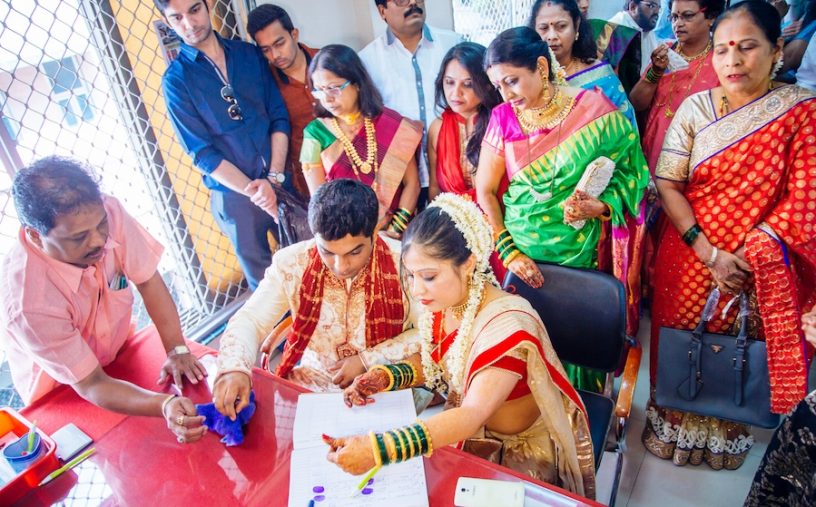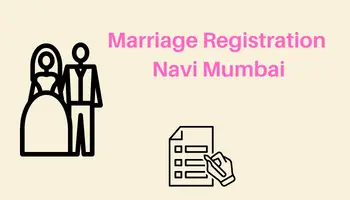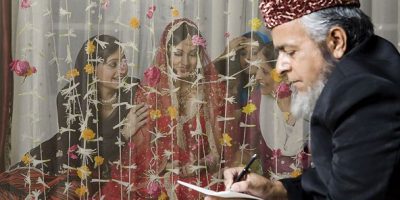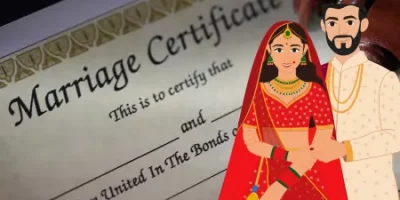Court marriage is a legal way for couples to get married under the Special Marriage Act, 1954, without any religious ceremony. Whether you’re planning a simple wedding, an inter-caste or interfaith marriage, or even marrying a foreign national, the court marriage procedure is designed to make it official and valid in the eyes of law. In this guide, we’ll explain everything from eligibility conditions, documents required and how to apply for court marriage certificate. You’ll also learn about the online court marriage procedure
Court Marriage
Court marriage is a legal way for two people to get married without following any traditional rituals or religious ceremonies. It can happen between a man and a woman of any caste, religion, or even nationality. For example, an Indian can also marry a foreigner through court marriage.
You don’t need a big wedding or a priest. Instead, both partners need to visit the Marriage Registrar and follow the official process. After that, you will get a court marriage certificate as legal proof of your marriage.
Who Should Consider Court Marriage?
Court marriage is a good option if:
- You want a simple, low-cost wedding without rituals
- You and your partner follow different religions or castes
- Your families are not supporting the marriage
- You want a marriage that is legally valid across India
- One of you is a foreigner or lives abroad
Anyone who wants to apply for court marriage in a safe, legal way can go for this option.
Legal Recognition: Special Marriage Act, 1954
Court marriages in India happen under the Special Marriage Act, 1954. A wedding can take place between any two people, whether from the same or different religions. This law protects your rights and ensures that your marriage is valid in the eyes of the law.
Once the court marriage registration is complete, you’ll receive an official certificate that is accepted for legal work, like applying for a visa, opening a joint bank account, or changing your name.
Eligibility condition for court marriage
Before you start your court marriage application, make sure you and your partner meet the basic rules. These are the court marriage eligibility conditions under the Special Marriage Act, 1954.
No Existing Marriage
Both people should be unmarried, or legally divorced, or widowed. If either of you is already married to someone else, you cannot apply.
Age Limit
- The groom must be at least 21 years old
- The bride must be at least 18 years old
(This is the official court marriage age limit in India.)
Mental Fitness
Both partners should be:
- Mentally sound
- Able to give valid consent
- Not suffering from serious mental illness or repeated mental breakdowns
Not Closely Related
The couple should not be related to each other in a way that is legally banned. This is called a prohibited relationship (like brother-sister or uncle-niece).
.
Exceptions to the eligibility conditions for court marriage
- Even if the couple is within degrees of prohibited relationship, they can get married if their custom allows them to do so.
- This exception will apply even when the customs of only one of the parties allow such marriage.
- Another exception is the citizenship rule for court marriages in Jammu & Kashmir. If the marriage is taking place in the state of J & K, then both parties must be citizens of India. Moreover, both parties should have domicile in a state to which this act applies. This means that foreign nationals cannot get married in Jammu & Kashmir under this Act.
- There is another condition for foreigners. They must live in India for at least 30 days before the marriage. They can get proof of residence from their local police station.
Court marriage procedure
- The parties have to file a Notice of Intended Marriage in the specified form to the Marriage Registrar of the district in which at least one of the parties to the marriage has resided for a period of not less than 30 days immediately preceding the date on which such notice is given.
- The notice is then published/put up by the Registrar of Marriage inviting objections if any.
- After the expiration of 30 days from the date on which notice of intended marriage has been published, the marriage may be solemnized unless it has been objected to by any person.
- The marriage may be solemnized at the specified Marriage Office.
- Both parties along with three witnesses are required to be present on the date of registration/Solemnization.
Documents required for court marriage
- Application form in the prescribed format with the prescribed fee.
- Passport Size Photographs of Marrying Persons.
- Residential Proof of Marrying Persons.
- Date of Birth Proof of Marrying Persons.
- Residential Proof and PAN Card of Three Witnesses.
- Death certificate or divorce decrees whichever is applicable, in case one of the parties had any marriages in the past.
Court marriage of an Indian and a foreign national

A marriage between parties one of whom at least is a citizen of India may be solemnized under the Special Marriage Act, in India before a Marriage Registrar in India or a Marriage Officer in a foreign country.
Eligibility criteria
- At least one of the parties should be an Indian citizen.
- The bridegroom must be 21 years of age; the bride must be 18 years of age.
- Neither party has a spouse living,
- Neither party is an idiot or a lunatic,
- The parties are not within the degrees of prohibited relationship
- Each party involved should not have any other subsisting valid marriage.
Documents required :
- Application form duly signed by both the parties.
- Documentary evidence of the date of birth of parties.
- Copy of Passport of both the parties with valid Visa.
- Residential Proof of both the parties.
- Documentary evidence regarding a stay at district in India of one of the parties for more than 30 days (Proof of stay or report from the concerned SHO).
- N.O.C. or Marital Status certificate from the concerned Embassy or Consulate in India by a foreigner partner.
- Death certificate or divorce decrees whichever is applicable, in case one of the parties had any marriages in the past.
Procedure:
- The parties to the marriage shall give notice in writing in the form specified, to the Marriage Officer of the district in which at least one of the parties to the marriage has resided for a period of not less than 30 days immediately preceding the date on which such notice is given, and the notice shall state that the party has so resided.
- All the documents are verified at the Office of Marriage Registrar.
- The law of other nations shall not be in conflict with Indian laws.
- The notice is then published inviting objection to the marriage if any.
- If no objection is made, then, on the expiry of the notice publishing period, the marriage may be solemnized.
- The marriage shall be solemnized in the presence of at least three witnesses.
- Further, the Marriage Certificate is entered and is granted by the Marriage Registrar.
Degree of prohibited relationship
When you apply for court marriage registration, one important rule is that you and your partner should not be too closely related by blood or family. This is known as a “prohibited relationship” under the Special Marriage Act, 1954.
If two people fall under this list, they cannot legally marry — unless their religion or custom specifically allows it.
What is a Prohibited Relationship?
A prohibited relationship means that the law does not allow a marriage between certain family members — like your close blood relatives or those related through marriage.
Part I – A woman cannot marry these male relatives:
- Her father, grandfather, or great-grandfather
- Her son, grandson, or great-grandson
- Her brother, brother’s son, or sister’s son
- Her uncle (mother’s or father’s brother)
- Her daughter’s husband or son’s son’s son
- Her stepfather or mother’s husband
Part II – A man cannot marry these female relatives:
- His mother, grandmother, or great-grandmother
- His daughter, granddaughter, or great-granddaughter
- His sister, sister’s daughter, or brother’s daughter
- His aunt (mother’s or father’s sister)
- His son’s wife or daughter’s daughter’s daughter
- His stepmother or father’s widow
Note: In this context, “widow” or “husband” also includes divorced persons
Exception to the Rule
If your custom or religion allows marriage between relatives listed above, then you can still apply for court marriage — but you may need to show proof of custom.
Even if only one partner’s custom permits it, the exception will still apply.
Why This Rule Matters
This rule exists to:
- Avoid health risks due to close blood relationships
- Keep marriage legally and socially acceptable
- Prevent misuse or forced marriages within family
Quick Tip: Before you fill out your court marriage application, make sure your relationship is not listed in the prohibited degrees — unless your custom clearly allows such marriage.
Conclusion:
- Court marriage is a simple process it saves our money and time.
- It has no expenses and it is safe and secure and legal of course.
- Also it saves the food who are ruined in marriages .
- You can distribute food with those money you save doing court marriage.
- Through court marriage you contribute to the cleanliness of the country.
FAQs
What is done in court marriage?
In a court marriage, two people get married by following a legal process, not religious rituals.
Here’s what happens:
- Filing a Notice- The couple submits a notice of intended marriage at the Marriage Registrar’s office.
- 30-Day Waiting Period -After notice, there is a 30-day waiting period. This time is given in case someone objects to the marriage.
- Marriage Day – After 30 days, both partners and three witnesses must visit the office. The couple signs the marriage register in front of the Registrar.
- Marriage Certificate – Once everything is complete, the couple receives a court marriage certificate. This is a legal proof of marriage.
You don’t need religious ceremonies, a priest, or a wedding hall. It’s a simple, official, and legal process.
What is the difference between court marriage and civil marriage?
Both court marriage and civil marriage are legal ways to get married, but they are slightly different in process and setup.
Court Marriage
- Happens directly at the Marriage Registrar’s office
- Follows the Special Marriage Act, 1954
- No religious rituals or customs involved
- Ideal for inter-caste or Indian + foreigner couples
- Needs 30-day public notice and witnesses
- Ends with a court marriage certificate as legal proof
Civil Marriage
- Can happen at any government-approved place, not just court
- May follow different laws like the Hindu Marriage Act, Christian Marriage Act, etc.
- May include a simple ceremony depending on customs
- Common for couples from the same religion or community
- Legal certificate is also issued, but with minor formalities based on religion or state





Leave a Reply